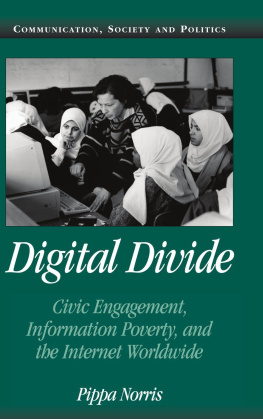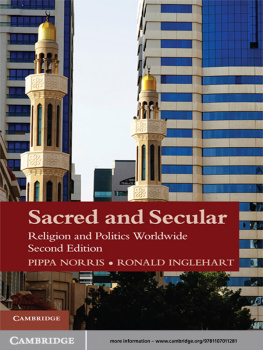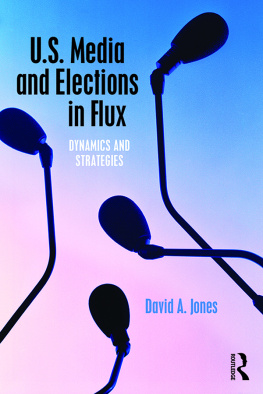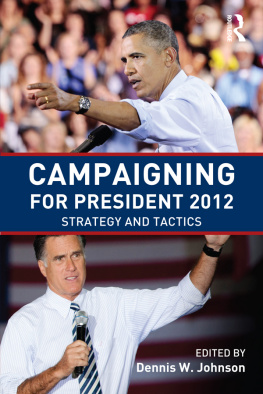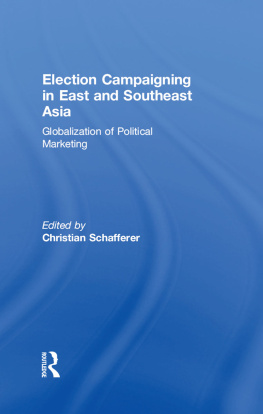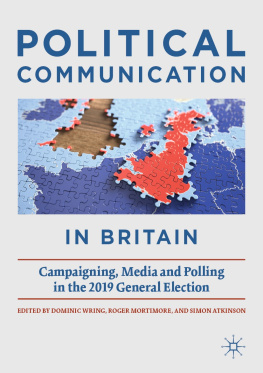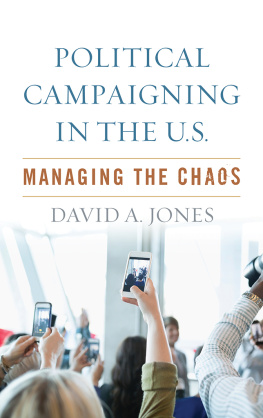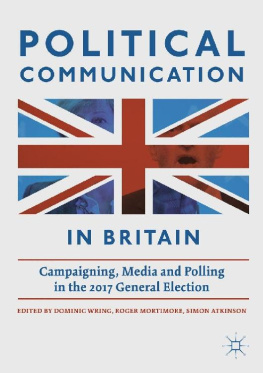On Message
On Message:
Communicating the Campaign
by
Pippa Norris, John Curtice, David Sanders,
Margaret Scammell and Holli A. Semetko
Copyright Pippa Norris, John Curtice, David Sanders, Margaret Scammell and Holli A. Semetko
First published 1999
All rights reserved. No part of this publication may be reproduced, stored in a retrieval system, transmitted or utilized in any form or by any means, electronic, mechanical, photocopying, recording or otherwise, without permission in writing from the Publishers.
 | A SAGE Publications Ltd
6 Bonhill Street
London EC2A 4PU
SAGE Publications Inc.
2455 Teller Road
Thousand Oaks, California 91320
SAGE Publications India Pvt Ltd
32, M-Block Market
Greater Kailash-I
New Delhi 110 048 |
British Cataloguing in Publication Data
A catalogue record for this book is available from the British Library
ISBN 0 7619 6073 2
ISBN 0 7619 6074 0 (pbk)
Library of Congress catalog card number
Typeset by Anneset, Weston-super-Mare, Somerset
Printed and bound in Great Britain by Athenaeum Press, Gateshead
Contents
List of Tables
List of Figures
Preface
In common with most large-scale projects this book has incurred many debts upon the way. The British General Election Study Campaign Panel 1997 was conducted by the Centre for Research into Elections and Social Trends (CREST). CREST is an ESRC Research Centre linking Social and Community Planning Research (SCPR) and Nuffield College, Oxford, in conjunction with Pippa Norris (Harvard University). In the Campaign Panel Waves B to D and the Election Study module on wave A were funded by the ESRC (grant no. H552/255/003). The survey was directed by Anthony Heath, Roger lowell, John Curtice and Pippa Norris and it would not have been possible without the help of Geoffrey Evans and Bridget Taylor at Nuffield College, Katarina Thomson and Alison Park at SCPR, and Ann Mair at Strathclyde University. We would also like to thank all the fieldwork interviewers and all the respondents who cooperated with the 1997 survey.
The experimental studies in television news were directed by David Sanders and Pippa Norris, and were organized at the University of Essex. The project was also generously funded by the ESRC (grant no. R000236756). The fieldwork depended upon the invaluable assistance of many graduate students at the University of Essex and the University of Westminster, who were ably organized by Deborah Harris. We would also like to thank the University of Westminster for fieldwork facilities. We greatly benefited from the help of Steven Barnett in the Department of Communications, University of Westminster, and also from Stephen Ansolabehere (MIT) and Shanto Iyengar (UCLA) who advised us on the research design.
The content analysis of Television and Press News during the 1997 British general election campaign was directed by Maggie Scammell (University of Liverpool) and Holli Semetko (University of Amsterdam). It was funded by the ESRC (grant no. R000236802) and the Amsterdam School of Communications Research. The coding was conducted by Peter Goddard and Katy Parry at the University of Liverpool and we are also grateful for the research assistance of Suzan van der Post.
The data on television audiences from the Broadcasters Audience Research Board (BARB) was generously supplied by Bill Meredith and we would also like to acknowledge the assistance of lane Sancho-Aldrich and Bob Towler at the Independent Television Commission who provided data from the ITC survey Television: The Publics View. We would also like to thank Peter Christopherson at CARMA International Ltd. for additional content analysis data.
This book is a companion volume to three closely related studies focusing on different aspects of electoral change: Critical Elections: British Parties and Voters in Long-term Perspective edited by Geoffrey Evans and Pippa Norris (Sage 1999), Alice Brown et at. The Scottish Electorate (Macmillan 1998), and New Labour and the Future of the Left by Anthony Heath et al. (forthcoming). This book is the product of collaboration between all the authors who worked together on this project in the United States, Britain and The Netherlands, with opportunities to come together mainly in conjunction with professional conferences. In terms of the division of labour, Margaret Scammell had the primary responsibility for on the influence of the press. We thank Katarina Thomson for material in the Technical Appendix. Pippa Norris contributed the remainder with invaluable help from all colleagues. As a results of our collaboration we hope that the overall book is more than the sum of its parts.
Our intellectual debts are many and varied. We would particularly like to acknowledge Jean Blondel and the members of ESRCs Election Study Management Advisory Committee (ESMAC) for supporting the research. We also appreciate comments from colleagues and discussants when draft papers were presented at a series of professional meetings in 1997 and 1998, including annual conventions of the Political Studies Association of the UK, the Elections, Parties and Public Opinion section of the PSA (EPOP), the European Consortium of Political Research, the Midwest Political Science Association, the American Political Science Association and the International Communication Association. Lastly the book would not have been possible without the constant encouragement, stimulus and critical advice from Marvin Kalb, Marion Just, Tim Cook, Fred Schauer, Richard Parker, Anna Greenberg, Edie Holway, Nancy Palmer and all colleagues at the Shorenstein Center on the Press, Politics and Public Policy at the Kennedy School of Government.
Harvard University, Cambridge, November 1998
Notes About the Authors
John Curtice is Deputy Director of CREST, and Professor of Politics and Director of the Social Statistics Laboratory at the University of Strathclyde. His publications include How Britain Votes (1985, with Roger Jowell and Anthony Heath); Understanding Political Change (1991, with Anthony Heath and others); and Labours Last Chance? (1994, co-edited). He has been a co-editor of SCPRs British Social Attitudes series since 1994 and is a regular consultant and commentator on electoral matters for the media.
Pippa Norris is Associate Director (Research) at the Shorenstein Center on the Press, Politics and Public Policy at the Kennedy School of Government, Harvard University. Recent books include, among others, Critical Elections (1999, with Geoffrey Evans); Critical Citizens (1999); Elections and Voting Behaviour (1998); Britain Votes 1997 (1997); and Electoral Change Since 1945 (1997). She was co-director of the 1997 British Election Study and co-edits The Harvard International Journal of Press/Politics.
David Sanders is Professor of Government and Pro-Vice-Chancellor (Research) at the University of Essex. His books include Patterns of Political Instability (1981), Lawmaking and Cooperation in International Politics (1986) and Losing an Empire, Finding a Role (1990). His recent publications include articles on electoral forecasting and outcomes in Political Studies, Electoral Studies, Political Quarterly, Parliamentary Affairs


